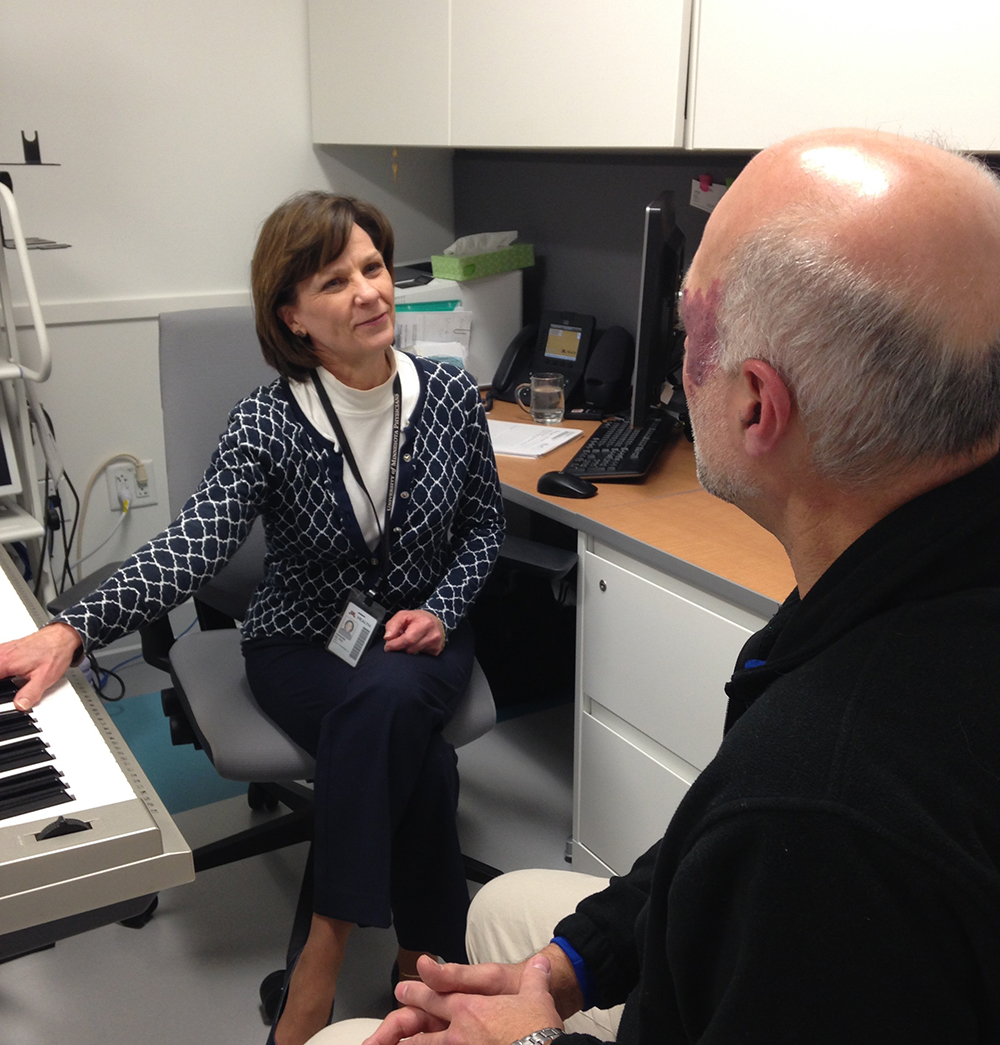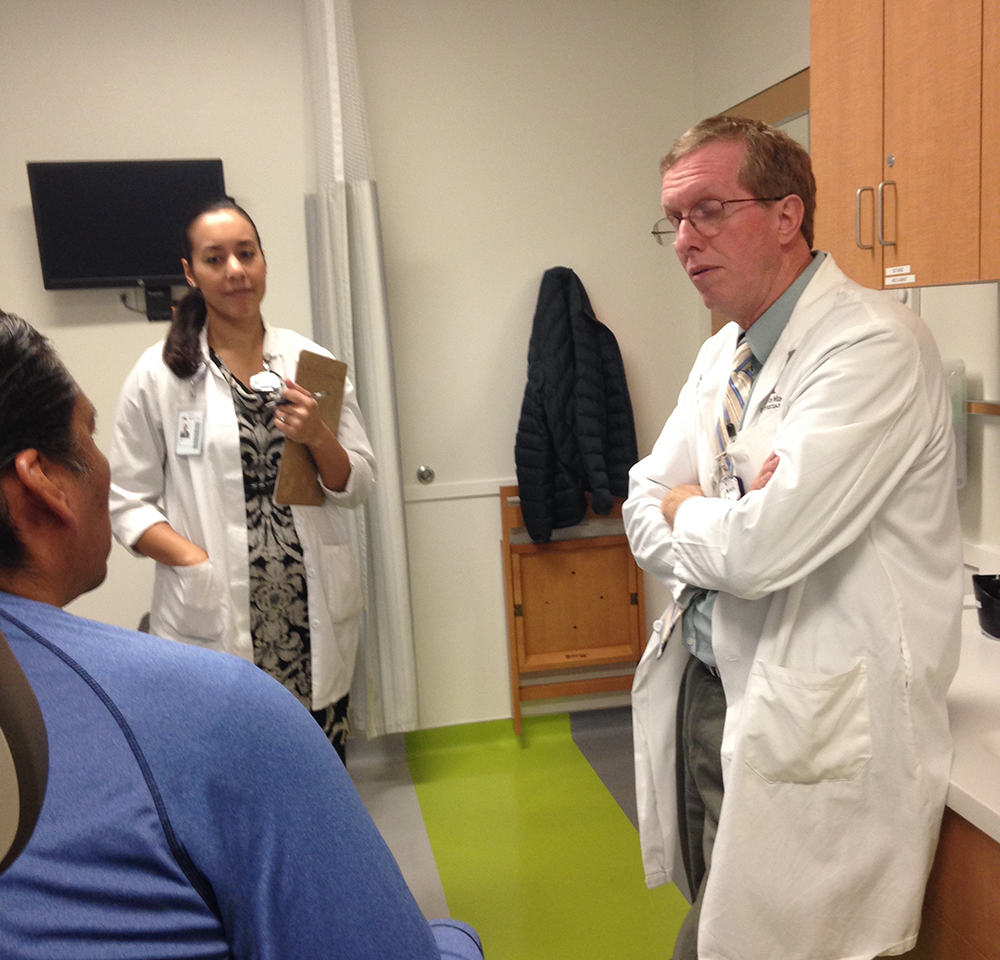Types of Treatment
Functional Voice Therapy
- Also known as voice therapy.
- Much like physical therapy, progressive exercises are taught over a series of sessions.
- Includes education about use and care of the voice and how the voice works.
- Varies in length from a single session to many sessions over several months.
- Should be done with a certified speech language pathologist with special expertise in voice disorders.
- Often done in conjunction with other kinds of treatments. If voice treatment includes surgery, it should always include at least one session of functional treatment to learn techniques for optimal healing.
At the Lions Voice Clinic, functional therapy is done with Dr. Michael, Ms. Butcher, or Mr. Weinstein. After the voice evaluation, we discuss your treatment plan with you, and therapy sessions are scheduled. The plan for therapy varies from patient to patient, but in general, the first three to four sessions are an hour long, and a week or two weeks apart. Sessions become gradually more spaced apart as you learn more advanced techniques and need more time to practice them and incorporate them into day to day voice use.
The Therapeutic Process

In therapy for voice disorders, a typical process in the first few sessions would include:
- A thorough discussion of your vocal lifestyle: voice needs, activities, and habits.
- Education about how to keep your voice healthy, given your vocal activities.
- Education about how your voice works, in order to understand the therapeutic process better.
- Exercises to keep your upper body relaxed while using the voice.
- Exercises for optimal breathing technique.
- Specific exercises to reduce the impact of the vocal folds to help reduce lesions, or to bring the muscles of the larynx into balance; these exercises often start with simple sounds; once the sounds are mastered, they are advanced to words, sentences, and finally conversational speech.
- Exercises and activities for specific vocal needs, such as singing, loud talking, prolonged talking, phone use, etc.
At the Lions Voice Clinic
In the Lions Voice Clinic, we tailor the exercises specifically to your strengths, weaknesses, and needs. We record the exercises during the session so you can practice at home with recording. This ensures optimal practice.
Medical Treatment
Treatment using medicines can be one of the components of treatment for voice disorders. In some cases the laryngologist will prescribe a medication to make the larynx more healthy. We may also suggest over-the-counter medications for certain vocal conditions.
There are few drugs specifically used to treat voice disorders. More commonly, the medications fall into several classes that have a secondary effect on the voice:
1. Medications to treat sinus drainage
Saline sinus rinses, decongestants, antihistamines, or steroid nasal sprays may be prescribed if the individual is bothered by congestion or sinus drainage that may irritate the tissues in the larynx, or thicken secretions, making it hard for the vocal folds to vibrate
2. Medications to treat acid reflux
Reflux is a common disorder that can cause stomach contents to reflux up the esophagus (the food pipe) and then spill over onto the larynx. The stomach juices are irritating to the larynx and may cause swelling or inflammation of the vocal folds. Medications such as Zantac or Prilosec may be prescribed to treat this condition, in order to improve the health of the larynx (see Related Disorders) along with anti-reflux precautions to minimize stomach contents regurgitation.
3. Medications to reduce inflammation of the vocal folds
On some occasions, vocal fold swelling warrants a prescription of oral steroids to reduce the inflammation. These are not used on a long-term basis due to side effects. See You and Your Voice.
4. Medications to treat fungal infections
Sometimes the voice problem is caused by a fungal infection, sometimes called thrush. Prescription medications can be helpful in these cases.
5. Over-the-counter medications
Conservative remedies are important at the Lions Voice Clinic. Maintaining good hydration of the mucosal tissues is extremely important to vocal health. We often recommend such strategies as saline nasal irrigation, personal steamers, salt water gargles and sucking on hard candies. Also, over-the-counter medications such as saline nasal sprays or guaifenesin (which thins secretions; the well-known brand name is Mucinex) are helpful in keeping drainage minimal and secretions thinned.
Surgical Treatment

Certain voice disorders are best treated with surgical intervention. Some lesions (growths) need to be surgically removed. In the case of vocal fold paralysis, there are several surgical options that provide a better voice. Drs. Goding, Misono and Gray are known internationally for their skills as surgeons.
At the Lions Voice Clinic
At the Lions Voice Clinic, surgery is almost always accompanied by at least one session of functional voice therapy, to teach the individual about postoperative voice care, and to teach vocal techniques to optimize the surgical result. Some surgical treatments are described on the Voice Disorders page.
Address
M Health Fairview Clinics and Surgery Center - Minneapolis
909 Fulton St. SE
Minneapolis, MN 55455